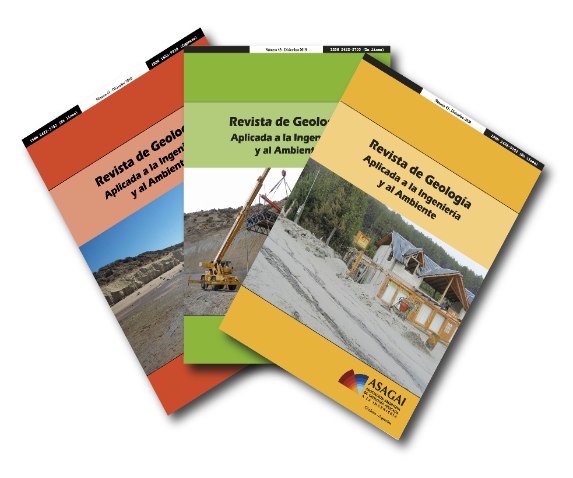Technical guidelines for the design of works with underground exploitation contemplating the characteristics of the local hydrogeological system. The case of the city of Santa Fe, Santa Fe Province, Argentina
Keywords:
groundwater, urban areas, underground constructions, waterproof protectionsAbstract
The building and infrastructure framework housed in the urban subsoil is subject to service conditions which must be considered in the project of all underground work for its correct execution, safety and functionality. The lack of tightness can severely reduce the long-term durability of the works and seriously affect their planned use resulting in dangerous, expensive, difficult to solve or irreversible processes.
From a field survey, numerous underground constructions with building pathologies related to seasonal groundwater entry were detected in the city of Santa Fe, works probably carried out in periods of lower groundwater levels than those that later had to withstand, ignoring the behavior of the underground water system and the action that the underground water could exert on the structure; also presenting inadequate waterproof protections or even without them.
The purpose of this work is to define technical guidelines in order to contribute to the protection and safety of underground works. To this end, an exhaustive investigation of waterproofing techniques and systems for underground works was carried out, which made it possible to develop a technical guide so that every underground work project is the result of an environmental assessment; the hydrogeological environment; of an appropriate structural design and including adequate waterproofing systems for the work under analysis. These results will contribute to managing the conditions or risks inherent to underground works, assuming the complex relationship between the use of urban land and the local hydrogeological environment.
References
British Standards Institution. (2009). BS 8102: 2009. Code of practice for protection of below ground structures. England.
Custodio, E. (2004). Hidrogeología urbana: Una nueva rama de la ciencia hidrogeológica. Boletín Geológico y Minero, 115, Número Especial, 283-288.
D'Elia, M. P., Paris, M., Tujchneider, O., Pérez, M., Pagliano, M. L., Gualini, S., & Fedele, A. L. (2011). Agua subterránea en áreas urbanas. VII Congreso Argentino de Hidrogeología y V Seminario Hispano-Latinoamericano sobre temas actuales de la Hidrogeología Subterránea. Captación y Modelación de Agua Subterránea, (págs. 46-53). Salta.
Foster, S., Lawrence, A., C Morris, B. (1998). Las aguas subterráneas en el desarrollo urbano. Evaluación de necesidades de gestión y formulación de estrategias. Documento técnico N° 390. Washington D.C.: Banco Mundial.
Lanzaro, M. V. (2020). El agua subterránea como condicionante ambiental de construcciones subterráneas en áreas urbanas. El caso de la ciudad de Santa Fe, Provincia de Santa Fe, Argentina. Tesis de Maestría. Universidad Nacional del Litoral, Facultad de Ingeniería y Ciencias Hídricas, Santa Fe.
Lanzaro, M. V., & D’Elia, M. P. (2021). Agua subterránea y construcciones subterráneas en áreas urbanas. El caso de la ciudad de Santa Fe, Provincia de Santa Fe, Argentina. Revista de Geología Aplicada a la Ingeniería y al Ambiente, (46), 25–42. Recuperado a partir de https://www.editoresasagai.org.ar/ojs/index.php/rgaia/article/view/197
Pagliano, M. L. (2008). Evaluación de las posibilidades de recarga en áreas urbanas. XII Encuentro de Jóvenes Investigadres de la UNL. III Encuentro de Jóvenes Investigadores de Universidades de Santa Fe. Santa Fe.
Reglamento Argentino de Estructuras de Hormigón. CIRSOC 201. (2005). Buenos Aires, Argentina. Recuperado a partir de https://www.inti.gob.ar.
Shanahan, P. (2009). Groundwater in the urban environment. En L. A. Baker, The water environment of cities (págs. 29-48). Cambridge: Springer Science+Business Media.
Downloads
Published
Issue
Section
License
Copyright (c) 2022 María Verónica Lanzaro

This work is licensed under a Creative Commons Attribution-NonCommercial-ShareAlike 4.0 International License.
Attribution - Non-Commercial - Share Alike (by-nc-sa): No commercial use of the original work or any derivative works is permitted, distribution of which must be under a license equal to that governing the original work.










